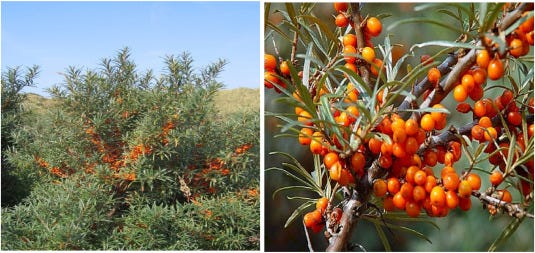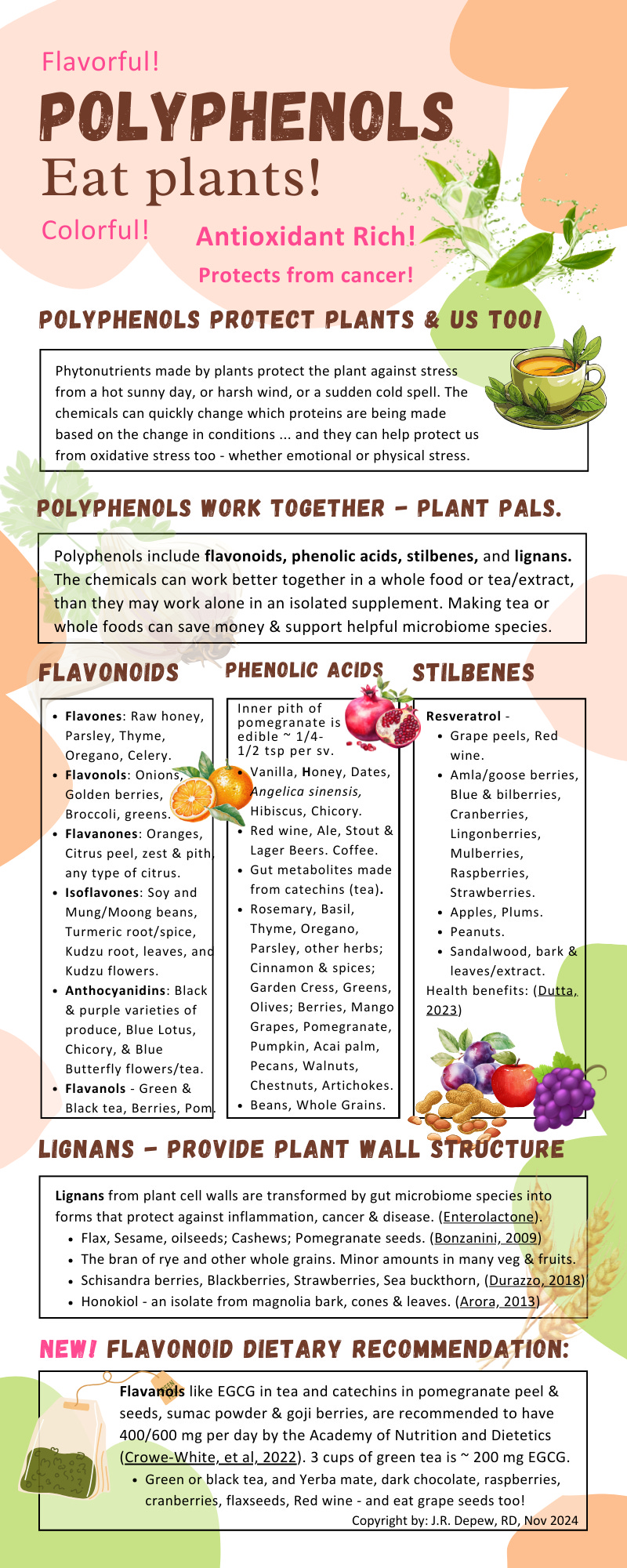Sea Buckthorn Berries - rich in polyphenols and carotenoids.
New graphic: Eat plants! Polyphenol food sources can have synergistic benefits greater than the individual isolated phytonutrients. Sea Buckthorn, like pomegranate has some of each main category.
I was asked about Sea Buckthorn and they are an edible golden berry used as fruit, juice, oil, and in capsule products. Sea Buckthorn berries seem to be trendy. Check the company for quality standards and fair pricing.

Typical supplement powdered berry/extract serving size:
350 mg to 1,000 mg per serving, usually in capsule form.
Pure sea buckthorn oil: 1,000 milligrams per serving, taken twice daily.
Serving of powdered berries: 5 grams ~ 2 teaspoons not packed. (BulkSupplements.com)
Sample prices of whole dried berries or powdered berries:
Dried Sea Buckthorn berries on Amazon are ~ $15 for 3 ounces ~ $5/ounce.
On BulkSupplements.com, powdered berries are ~ $26 for a pound / a half kilogram, ~ $1.50/ounce. A review of the powder:
"Good for smoothies, bought this on a whim, never had even heard of it before. But I'm glad I did, because it is absolutely delicious tasting. Tastes a bit like dried strawberries or dried blackberries. Great for smoothies and a pretty yellow color to it, so you could probably use it as a natural food-dye for sweet dishes" - Anthony T., (BulkSupplements.com)
Nutrient & Phytonutrient content:
Sea Buckthorn berries are rich in carotenoids - giving the golden color - including the vitamin A precursor beta-carotene and eye protecting lycopene. The berries are also a source of vitamin C and E, iron and calcium. They are rich source of flavonoids including the catechins found in tea and pomegranate peel. They also have quercetin, (Dubey, et al., 2024, the zinc ionophore used in Dr. Zelenko's Covid protocol (Vitamin C, D3, zinc and quercetin).
Sea Buckthorn berries have fatty acids and produce an oil that is an uniquely good source of "omega-7 fatty acid (palmitoleic acid), which has anti-inflammatory and skin-protective properties." (Dubey, et al., 2024)
Sea Buckthorn products appear to be trendy online - buyer be wary of the source regarding quality of product and a fair price.
Cautions against use:
Avoid if using blood thinning or blood sugar lowering medications, or cyclosporine. (Dubey, et al., 2024)
Allergic reactions to Sea buckthorn have also occurred. (Dubey, et al., 2024)
Being rich in vitamin A and carotenoids - people with Retinoid Toxicity would need to avoid use.
Health Benefits of Sea Buckthorn
"Antioxidant: Sea buckthorn can protect the cells from oxidative stress and
free radical damage.
Anti-inflammatory: Sea buckthorn can modulate the immune system and reduce inflammation.
Anti-cancer: Sea buckthorn can inhibit the growth and spread of cancer cells.
Hepatoprotective: Sea buckthorn can prevent liver damage and improve liver function.
Cardiovascular: Sea buckthorn can lower blood pressure, cholesterol, and
triglycerides, and prevent atherosclerosis.
Neuroprotective: Sea buckthorn can improve cognitive function and memory, and protect the brain from neurodegeneration.
Dermatological: Sea buckthorn can improve skin health and appearance, and treat skin disorders such as eczema.
Ophthalmological: Sea buckthorn can protect the eyes from dryness, irritation, and infection.
Gastrointestinal: Sea buckthorn can heal ulcers and gastritis, and regulate bowel movements." (Dubey, et al., 2024)
So I added Sea Buckthorn to my Polyphenol graphic - but there are so many flavonoid rich foods that I put it in the Lignan section. It would also provide Phenolic Acids. These polyphenols work together and eating the whole food, therefore, is a health win, as they are more potent together than as isolated chemicals. Their support of healthy gut microbiome species may be part of the synergistic plant magic.
Sea buckthorn and pomegranate/peel have polyphenols from all of four of the groups including a little resveratrol - a stilbene. They have a lot of flavonoids, the seed have lignans, and there are phenolic acids and the catechins can be transformed into phenolic acids by beneficial gut microbes. Our gut microbes support our gut 'brain' cells, and that helps protect the brain cells in our skull too!

Disclaimer: This information is being provided for educational purposes within the guidelines of Fair Use and is not intended to provide individual health guidance.
Reference
Roshan Kumar Dubey, Satyam Shukla, Vaishnavi Shukla, Sumit Singh, Sea buckthorn: A potential dietary supplement with multifaceted therapeutic activities, Intelligent Pharmacy, Vol 2, Issue 5, 2024, pp 681-687, ISSN 2949-866X,https://doi.org/10.1016/j.ipha.2023.12.003. https://www.sciencedirect.com/science/article/pii/S2949866X23001296





Oh, I forgot to harvest some again this year. In our parts, they were often planted in parks in ~1970s and some have gone feral if you know where to look.
By the way, sea buckthorns are dioecious, meaning there are separate male and female plants, and only the latter yield berries (what a surprise!).
Great stuff Jennifer!
I add them to my ocular-regenerative-and-ocular-protective food list and linked your post.
https://gavinmounsey.substack.com/p/ocular-regenerative-and-ocular-protective